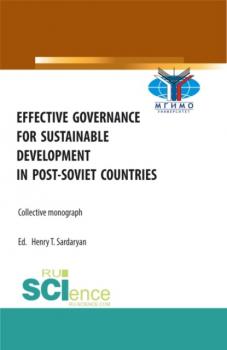ТОП просматриваемых книг сайта:
Генри Тигранович Сардарян
Список книг автора Генри Тигранович СардарянEffective Governance for Sustainable Development in Post-Soviet Countries. (Аспирантура, Бакалавриат, Магистратура). Монография. - Генри Тигранович Сардарян
Аннотация
The book is dedicated to the implementation of the UN Principles of Effective Governance for Sustainable Development, agreed at CEPA 17 and endorsed by the UN Economic and Social Council (ECOSOC) in July 2018 in the Post-Soviet countries. The principles are intended to help interested countries to build, on a voluntary basis, effective, accountable and inclusive institutions at all levels, in the context of the 2030 Agenda for Sustainable Development. The research analyses strategies and road maps, legislation and administrative practices in Armenia, Azerbaijan, Belarus, Kazakhstan, Kyrgyzstan, Moldova, Russia, Tajikistan, Ukraine and Uzbekistan. The authors of the country reports are leading governance experts in the relevant regions. The scope of the research is new and quite extensive since it is the first time the data on effective governance has been aggregated and grouped on a regional basis for these countries. The results of the research were presented during the 21st Session of the UN Committee of Experts on Public Administration and reflected in the final resolutions and working papers of the organization.
Государственное управление в России и зарубежных странах. (Бакалавриат, Магистратура). Учебник. - Генри Тигранович Сардарян
Аннотация
Посвящен сравнительному анализу систем государственного управления в странах различных цивилизаций и нацелен на понимание глубинных причин их формирования в известной нам форме, исходя из их религиозно-культурного наследия. Дает возможность получить системное понимание основных трендов государственного управления во всем мире и опыта самых различных государств по реформированию собственных политических и управленческих систем. Соответствует ФГОС ВО последнего поколения. Для студентов бакалавриата и магистратуры, обучающихся по направлениям подготовки «Государственное и муниципальное управление», «Политология» и «Международные отношения».
Государственное управление в России и зарубежных странах. (Бакалавриат, Магистратура). Учебник. - Генри Тигранович Сардарян
Аннотация
Посвящен сравнительному анализу систем государственного управления в странах различных цивилизаций и нацелен на понимание глубинных причин их формирования в известной нам форме, исходя из их религиозно-культурного наследия. Дает возможность получить системное понимание основных трендов государственного управления во всем мире и опыта самых различных государств по реформированию собственных политических и управленческих систем. Соответствует ФГОС ВО последнего поколения. Для студентов бакалавриата и магистратуры, обучающихся по направлениям подготовки «Государственное и муниципальное управление», «Политология» и «Международные отношения».
Effective Governance for Sustainable Development in Post-Soviet Countries. (Бакалавриат, Магистратура). Монография. - Генри Тигранович Сардарян
Аннотация
The book is dedicated to the implementation of the UN Principles of Effective Governance for Sustainable Development, agreed at CEPA 17 and endorsed by the UN Economic and Social Council (ECOSOC) in July 2018 in the Post-Soviet countries. The principles are intended to help interested countries to build, on a voluntary basis, effective, accountable and inclusive institutions at all levels, in the context of the 2030 Agenda for Sustainable Development. The research analyses strategies and road maps, legislation and administrative practices in Armenia, Azerbaijan, Belarus, Kazakhstan, Kyrgyzstan, Moldova, Russia, Tajikistan, Ukraine and Uzbekistan. The authors of the country reports are leading governance experts in the relevant regions. The scope of the research is new and quite extensive since it is the first time the data on effective governance has been aggregated and grouped on a regional basis for these countries. The results of the research were presented during the 21st Session of the UN Committee of Experts on Public Administration and reflected in the final resolutions and working papers of the organization. Key words: public administration, sustainable development, efficient governance, united nations, reforms, Post-Soviet countries.
Государственное управление в России и зарубежных странах. (Бакалавриат, Магистратура). Учебник. - Генри Тигранович Сардарян
Аннотация
Посвящен сравнительному анализу систем государственного управления в странах различных цивилизаций и нацелен на понимание глубинных причин их формирования в известной нам форме, исходя из их религиозно-культурного наследия. Дает возможность получить системное понимание основных трендов государственного управления во всем мире и опыта самых различных государств по реформированию собственных политических и управленческих систем. Соответствует ФГОС ВО последнего поколения. Для студентов бакалавриата и магистратуры, обучающихся по направлениям подготовки «Государственное и муниципальное управление», «Политология» и «Международные отношения».
Effective Governance for Sustainable Development in Post-Soviet Countries. Аспирантура. Бакалавриат. Магистратура. Монография - Генри Тигранович Сардарян
Аннотация
The book is dedicated to the implementation of the UN Principles of Effective Governance for Sustainable Development, agreed at CEPA 17 and endorsed by the UN Economic and Social Council (ECOSOC) in July 2018 in the Post-Soviet countries. The principles are intended to help interested countries to build, on a voluntary basis, effective, accountable and inclusive institutions at all levels, in the context of the 2030 Agenda for Sustainable Development. The research analyses strategies and road maps, legislation and administrative practices in Armenia, Azerbaijan, Belarus, Kazakhstan, Kyrgyzstan, Moldova, Russia, Tajikistan, Ukraine and Uzbekistan. The authors of the country reports are leading governance experts in the relevant regions. The scope of the research is new and quite extensive since it is the first time the data on effective governance has been aggregated and grouped on a regional basis for these countries. The results of the research were presented during the 21st Session of the UN Committee of Experts on Public Administration and reflected in the final resolutions and working papers of the organization. Key words: public administration, sustainable development, efficient governance, united nations, reforms, Post-Soviet countries.






